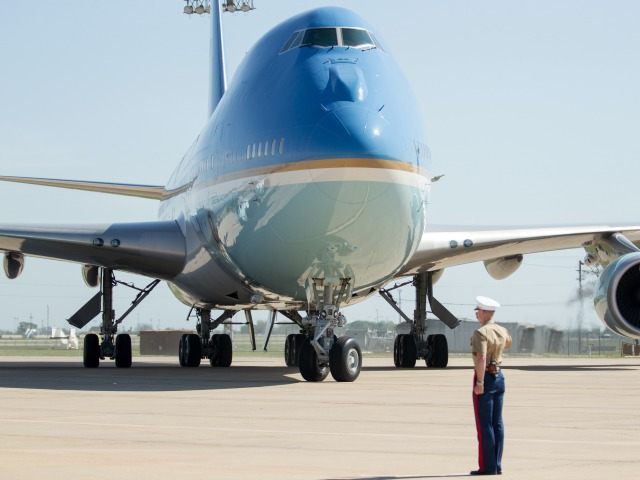Texas-based GDC Technics, a division of the Saudi Arabia-owned MAZ aviation, serves as a subcontractor for Boeing on President Barack Obama’s Air Force One and other VIP jets that flay Cabinet secretaries and other dignitaries across the globe, USA Today learned from the U.S. Air Force.
The company also services the E-4B, an aircraft known as the “Doomsday Machine” because it serves as an aerial national command post “in case of national emergency or destruction of ground command and control centers,” notes military branch.
USA Today points out that only American citizen employees at GDC Technics, who pass proper background checks, are able to repair Air Force One with escorts.
Security of Air Force One is a top priority for the Air Force, noted Lt. Col. Chris Karns, a spokesman.
“While we can’t go into specific details about security measures, there are stringent security protocols in place,” Col. Karns told USA Today. “The security processes related to Air Force One are proven and effective.”
“GDC, a subcontractor to Boeing, does not have unsupervised access to the aircraft nor do they have access to sensitive information about the plane. This particular subcontract is for cabinets, desks, and other furnishings and all work is conducted offsite,” added the colonel.
Although the White House declined to comment on the revelation, the Pentagon conceded for the first time that a company with foreign ties has worked on the Air Force One.
While the Pentagon’s dependence on contractors for military work grows, the United States reliance on foreign owned facilities has been an issue, declares USA Today.
“In 2006, Congress killed the sale of U.S. port facilities to Dubai Ports World of the United Arab Emirates because of concerns about foreign ownership of key infrastructure,” it adds.
In the wake of the Dubai Ports World controversy, the U.S. implemented a law in 2007 mandating the Committee on Foreign Investment in the United States (CFIUS), a component of the U.S. Treasury Department, to review “any acquisition of a U.S. company that could have an impact on national security,” reports USA Today.
However, GDC Technics was acquired in 2013 before the law was passed and it remains unclear whether it was reviewed by the committee.
“By law, information filed with CFIUS may not be disclosed by CFIUS to the public,” Department of Treasury spokeswoman Whitney Smith told USA Today. “Accordingly, the department does not comment on information relating to specific CFIUS cases, including whether or not certain parties have filed notices for review.”
Guards from the San Antonio-based GDC Technics company who have passed FBI background checks and have security clearances are charged with providing around the clock security to GDC facilities, points out the company, noting that they are equipped with advanced surveillance systems to ensure the safety of aircraft.
The Congressional Research Service (CRS), which provides research and analysis on all current and emerging issues of national policy, reports, “Contractors often outnumber U.S. military personnel on the ground in Iraq and Afghanistan since 2001… In June 2015, for example, there were about 9,000 U.S. troops in Afghanistan compared with 29,000 Pentagon contractors.”
In 2013, Saudi businessman and MAZ-owner Mohammed Alzeer acquired the company’s subsidiary GDC, which has operations in Fort Worth, Texas, and in Germany.
Saudi Arabia is a U.S. ally and has recently flown combat missions against Islamic State targets in the Middle East. However, the Sunni nation is also home to terrorist organizations.
The National Defense Authorization Act (NDAA) of 2011 prompted the Pentagon to impose contract solicitation rules that require prime contractors to verify and be responsible for the security and supply chain provided by subcontractors.
These rules have been updated by the Pentagon as of October 2015. The Congressional Taskforce on Terrorism and Unconventional Warfare, chaired by Rep. Robert Pittenger (R-NC), has recommended that the General Services Administration consider adopting Pentagon’s rule mechanism that requires prime contractors to assume greater supply chain security responsibilities for subcontractors they hire.

COMMENTS
Please let us know if you're having issues with commenting.